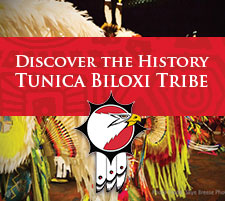The first recorded European contact with the Tunica and Biloxi people was by Spanish explorer hernando de Soto in 1541 in Mississippi. The people, who then existed as two distinct but closely related tribes, were farmers and traders. They exchanged goods with the Spanish, and in the late 17th century also with the French, with whom they eventually became allied. In 1731, natchez Indians killed Tunica Chief Cahura-Joligo and the two tribes, now joined together, migrated south to Trudeau, Louisiana. In the years between 1764 and 1790, they once again migrated, this time west across the Mississippi River to Pointe Coupee. In 1790 they moved a final time, to the vicinity of Marksville, Louisiana-the site of their present -day reservation.The recent renaissance of the Tunica dn Biloxi people is perhaps surprising to everyone but themselves. They have always known wh they were and where they came from, even before the tribe attained federal recognitionin1981. As a testament to, and remainder of, the tribe's longstanding presence in what became the state of Louisiana, an immense store of priceless archaeological artifacts was uncovered in the summer of 1968 on the grounds of the Old Trudeau Plantation in Tunica, locate din central Louisiana. The find became know and the "Tunica treasure" and encompasses some 225,000 items of both domestice and ceremonial use, including bowls, jars, and jugs, knives, stoneare, glazed earthenware, pots, and pans of iron and brass, and ceremonial objects such as pipes. These objects of, both native and European origina, literally tell the story of the tribe's early colonial relationships with the region's Spanish and French settlers.According to Jefferson hennessy, author of "The Legend of the Tunca Treasure" (Country Roads, OCt. 2003), the find was "unparalleleled at any other know contemporary Native site of the mid-eighteenth century in the Southeast. The Tunicas' entrepreneurial shrewdness of traders of horses and salt, and their value as military allies iwth French and Spanish colonsts, earned them the rewards of European contact and friendship." This simple fact emerges: The Tunica People were and immensely resourceful people for the times in which they lived.
Chariman Earl J. Barbry, Sr.. Cherishing our past, bulding for our future" is the motto of Tunca-Biloxi Tribal Chairman Earl J barbry, Sr. Barbry, a descendant of hereditary chiefs, has been chairman since 1978. Economic development and self sufficiency were priorities of the newly recognized tribe, whose people wanted more than the meager funding provided by the federal government for such things as modern housing, health and education-services and programs that other Americans take for granted. barbry worked hard to make such things a reality on the reservation, where there were once shacks instead of modern houses, no indoor plumbing or drinking water (unless it was carried from a nearby creek), and no school bus transportation for the tribe's children. Chairman Barbry has changed all that and ushered in a new era for his people.
Indian gaming provided the tribe its opportunity to move out of poverty. In1991, negotiations began for the aproval and construction of Louisiana's first land-based casino. grand Casino Avoyelles, later renamed paragon Casino Resort, opened in June 1994.
By all accounts, the tribe's casino resort has been an astounding success. The property has expanded over the years, and tday includes a RV park and 230 -acre golf course, Tamahka Trials, The resort has nearly 1,800 employees, who have added training and educationsl opportunities intended to advance careers. Avoyeles Parish, once among the very poorest parishes in Louisiana, is now flourishing, with a majority of the casino's employees drawn from the area's non-Native populace, hich has significantly improved the parish's employment rates. According to the tribe's 2002 Economic Impact report, the median per-capita income in Avoyelles Parish rose from $6,784 in 1990 to $29,389 in 2000.
Businesses Grow and Donations Up
The tribe also has branched out inot other businesses, including five fast-food franchises: four Burger Kings (the first Native American Burger King franchises in the country) and one Church's Chicken. This year the tribe will open and educational resource center on the reservation for its collectionof European and Native atrifacts. The center will include a museum, gift shop, tribal ffices, library, restoration and conservation laboratory, computer lab, exhibit hall and other facilities that will be open to both tribal membres and the genral public.
The tribe shares it success in countless ways; it is a generus and concerned neighbor to those who are less fortunate. Its donation program, begun in 1994, gives more than $125,000 annually to nonprofit organizations locally, reginaly and nationally. The American Red Cross, Marksville Lions Club, Avoyelles Council on Aging, Louisiana Special Olympics, Muscular Dystrophy Association and the Hope House of Central Louisiana are just a few of the organizaitons the tribe has helped. Committed to education for tribal and non-tribal students, the tribe awards scholarships annually to local high schools and to students attending Louisiana State University. The tribe also sets aside $50,000 annually for organizations and events in central Louisiana that promote tourism, economic stimulus and cultural exchange. It distributes sued coats to the needy, and new toys and stuffed animals are given to local organizaitons to ensure less-fortunatie children have toys at Christmas.
In a time when Indian gaming and tribal soverignty continue to be attacked in the national mainstream median and the ocurts, it is important for tribes like the Tunica-Biloxi to mnitor the threats and to participates actively in the political arean. With and eye toward protecting what the tribe has worked so hard to develop within their community and to position itself favorably among the local, state, and federal governments, Barbry and the tribal council formed the TBIPAC- in 1998. Councilor Daivd Rivas administers teh PAC, which has been a resounding success, nurturing relationships with politicians and others.
"We as representatives of our tribes, must never forge that the responsibilities that have been bestowed upon us by the people are not a mere gesture to fulfil a void or to dictate authority, but provide an opportunity to create effective change and assist the tribe infulfilling total econmic independence and creating a shield for sovereignty that no bureacrat, politician or self-interest group in Washington, D.C., or within our on state, can ever penetrate, "Rivas says. "If it is the olitical game we must paly , then let us not just be observers, watching from the sideline, but well-trained players who will take on all challengers to defend that which ismost precious to us-our sovereignty and our people."
"The Tunca-Biloxi Tribe of Louisiana is determined to remain self-reliant, caring of our fellow human beings and fiercely proud of our traditions, "Barbry says. "We look to the future with great anticipation and excitement."
Paragon Casino Resort
Encompassing mre than 74,120 square feet of gaming space, the Paragon Casino Resort offers more than 2,100 slot machines in many denominations, 46 gaming tables(including craps, roulette and blackjack) and a poker room. There is a multitude of dining options, including steak, seafood, Cajun cooking, a 1950s-style diner and a lavish buffet. Light fare can be had at Tamahka Trails Golf Course, and adjoining 18-hole, 230 acre property. The hotel contains 218 roms and 52 executive suites, and outdoor spa and swimming pool. Entertainment, including popular, nationally known musical acts, is offered year-round in the Mari Center Show Room. There also is a delux RV park featuring 185 drive-through pads with fullhokups, a guest lodge, a loung with a big-screen television, a swimming pool and laundry. 711 Paragon Place, Marksville, LAa 71351; 800/946-1946, reservations 800/642-7777 or www.paragoncasinoresort.com







